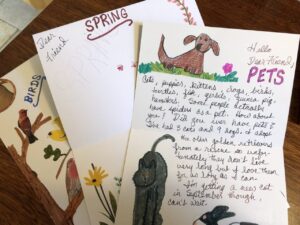By Kathryn White
Twice a month, Mary Wilham takes a packet of five letters to the post office near her house in the West Highland neighborhood.
In the days that follow, her letters make their way to intended recipients: people who are strangers to Wilham, residents in long-term care facilities in towns Wilham has been to or would like to visit someday.

“That gives me a topic to write about,” Wilham said, “I’ll ask questions about it.”
Wilham has volunteered for the organization Letters Against Isolation (LAI) since shortly after it was founded in April 2020. Wilham learned about LAI from her friend Ellen Rabinowitz. During the early days of the COVID-19 pandemic, Rabinowitz, who had been a volunteer at Denver Zoo, was looking for ways to volunteer from home. She came across LAI online, and was immediately drawn to the story of how it began.
Two teen sisters in Boston, Shreya and Saffron Patel, had been reaching out to their grandparents routinely. One day they noticed that their grandmother, isolated in London at the time, was enthusiastic about a letter she had received from a friend.
It brightened her day at a time when she really needed it. The sisters wondered if they could have that kind of effect in Boston. They reached out to nearby long-term care facilities and within days had residents lined up to receive letters.
Today, LAI’s 22,000-plus volunteers have sent more than 654,000 cards and letters in 16 languages. Social isolation and loneliness have reached levels so significant in the U.S. that this year the Surgeon General weighed in.

Dr. Vivek H. Murthy, 19th and 21st Surgeon General of the United States, calls attention to “the serious public health issue” in the 2023 advisory, “Our Epidemic of Loneliness and Isolation: The U.S. Surgeon General’s Advisory on the Healing Effects of Social Connection and Community.”
“Loneliness is far more than just a bad feeling,” Murthy said. “It harms both individual and societal health. It is associated with a greater risk of cardiovascular disease, dementia, stroke, depression, anxiety, and premature death. The mortality impact of being socially disconnected is similar to that caused by smoking up to 15 cigarettes a day, and even greater than that associated with obesity and physical inactivity. And the harmful consequences of a society that lacks social connection can be felt in our schools, workplaces, and civic organizations, where performance, productivity, and engagement are diminished.”
The National Institutes of Health (NIH) makes an important distinction, especially for those focused on improving social connectedness and decreasing feelings of loneliness.
“Loneliness and social isolation are different, but related. Loneliness is the distressing feeling of being alone or separated. Social isolation is the lack of social contacts and having few people to interact with regularly.”
“Senior loneliness was always a problem,” Rabinowitz said, “but the public wasn’t aware of it until we were suddenly all isolated.” “It’s been a bonding experience for our volunteers as well,” continued Rabinowitz. “You’ve got thousands of people around the world doing this, just because it’s the right thing to do, and we have all bonded in a way.”
Facilities or programs that serve older adults can sign up on the LAI website, where they indicate how many letters they’d like to receive and in what languages. Volunteers sign in every two weeks at lettersagainstisolation.com to select the number of letters they’d like to write during that cycle, and which facility they’d like to send their letters to.
If the volunteer knows multiple languages, they can choose to write letters in them. For volunteers unsure what to write, Rabinowitz points to resources on the website.
“There are blogs about what to write to a stranger,” she said. There are blogs on a host of topics volunteers might be curious about as they get started: card decorating tips, holiday guidelines, jokes and trivia, and monthly “dates of distinction.”
Wilham recalled a tip she gained from one of the monthly volunteer Zoom parties: “If you’ve just met someone, what three things might you say about yourself?”
Wilham, who used to work as an arborist, likes to incorporate trees and birds into her letters. “That’s one of the things I’ll do, talk about the trees. I’ll write ‘go to a window you’re near and look out. What trees do you see?” She also includes comic strips and quiz questions.
Rabinowitz interjected, “By asking questions, you’re stimulating memories.” The Surgeon General’s advisory on loneliness and isolation outlines ways to foster social connection. Recommendations are tailored to stakeholder groups such as health care, education, philanthropy, parents and caregivers, media, tech companies, and community-based organizations.
Recommendations for individuals include investing time in relationships, minimizing distractions during time spent with others, seeking opportunities to serve and support others, engaging with people of different backgrounds and experiences, participating in community groups, reducing activities that lead to feelings of loneliness and disconnection, finding time for civic engagement, and demonstrating the value of connection in everyday interactions.
Last summer, Rabinowitz and LAI co-founder Shreya Patel visited North Denver’s Dayspring Villa on West 26th Avenue, where LAI volunteers have been sending letters and cards for over two years. Not far from the kitchen nook where Wilham decorates and writes 10 cards a month, Dayspring Villa has a basket in a common area where residents can pick up letters and read them.
During the July 2022 visit, Rabinowitz and Patel sat down with a Dayspring Villa resident who has enjoyed reading the letters. “It brings a moment in our day where the world stops, and someone from another place has taken the time to send us a short message, or a long letter, or a picture that gives us some joy to our hearts,” she said.
Kathryn has lived in north Denver since around the time the Mount Carmel High School building was razed and its lot at 3600 Zuni became Anna Marie Sandoval Elementary. She’s raised two children in the neighborhood, worked at several nonprofits and volunteered with the Alzheimer’s Association Colorado Chapter.

Be the first to comment